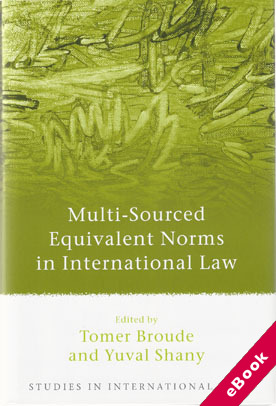
The device(s) you use to access the eBook content must be authorized with an Adobe ID before you download the product otherwise it will fail to register correctly.
For further information see https://www.wildy.com/ebook-formats
Once the order is confirmed an automated e-mail will be sent to you to allow you to download the eBook.
All eBooks are supplied firm sale and cannot be returned. If you believe there is a fault with your eBook then contact us on ebooks@wildy.com and we will help in resolving the issue. This does not affect your statutory rights.
Recent decades have witnessed an impressive process of normative development in international law. Numerous new treaties have been concluded, at global and regional levels, establishing far-reaching international legal and regulatory regimes in important areas such as human rights, international trade, environmental protection, criminal law, intellectual property, and more.
New political and judicial institutions have been established to develop, apply and adjudicate these rules. This trend has been accompanied by the growing consolidation of treaty norms into international custom, and increased references to international law in domestic settings. As a result of these developments, international relations have now reached an unprecedented level of normative density and intensity, but they have also given rise to the phenomenon of 'fragmentation'.
The debate over the fragmentation of international law has largely focused on conflicts: conflicts of norms and conflicts of authority. However, the same developments that have given rise to greater conflict and contradiction in international law, have also produced a growing amount of normative equivalence between rules in different fields of international law. New treaty rules often echo existing international customary norms.
Regional arrangements reinforce undertakings that already exist at the global level; and common concerns and solutions appear in many international legal fields. This book focuses on such instances of normative parallelism, developing the concept of 'multisourced equivalent norms' in international law, with contributions by leading international law experts exploring the legal and political implications of the concept in a variety of contexts that span the full spectrum of international legal norms and institutions.
By concentrating on situations governed by a multitude of similar norms, the book emphasizes the importance of legal contexts and institutional settings to international law-interpretation and application.